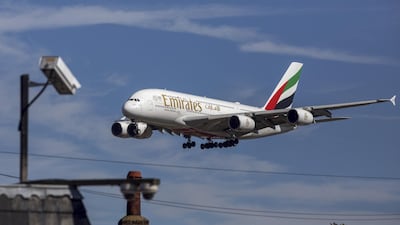Emirates president Tim Clark said the airline's first half financial results, which are typically reported in November, are set to beat last year's performance and exceed the airline's expectations.
The Dubai-based carrier will deliver better-than-expected results for the first six months of its fiscal year ending September 30, despite the closure of the southern runway at Dubai International Airport for a 45-day period during the peak travel period, Mr Clark told reporters on the sidelines of an aviation security event on Sunday.
"I’m content that it is better than we thought it would be, given that we had to shut the airport runway for seven weeks and it’s also better than the corresponding half last year," he said.
The world's biggest long-haul carrier reported a 86 per cent plunge in first-half profits in its fiscal year. The results were the lowest in a decade, as higher oil prices and a stronger dollar pressured its margins. Emirates began a strategic review — examining its routes and fleet — triggered by a faltering global economy and the end of Airbus' A380 programme as the superjumbo is a core aircraft in its fleet.
Emirates will also postpone the launch of its premium economy class as Mr Clark anticipates Boeing's new 777X wide-bodies will not be delivered as scheduled by June 2020.
"I would suggest quite strongly that it won’t," he said.
The airline will now roll out the new premium-economy class in December 2020 on its Airbus A380 double-deckers, he said.
Boeing had earlier said it would postpone the first flight of its 777X jets to next year amid problems with its General Electric engines and suggested deliveries may be delayed. Emirates, the launch customer of the 777X with 150 planes on order, was scheduled to receive its first delivery next year.
"The 777X was delayed because of the GE engine, we still have not had sight of a resolution on that, so if you ask me when, how, or what, I can't tell you, because I don’t know," Mr Clark told reporters.
Earlier this month, Mr Clark delivered a stern message to Boeing and Airbus, as well as their engine-makers, saying he would no longer accept new planes unless Rolls-Royce and GE improve their reliability.
Emirates began considering the option of adding premium economy in 2016 when low oil prices clipped demand for travel in the region and the offering was expected to lure price-sensitive travellers. The new class typically offers more legroom and other perks at a higher fare than regular economy class but cheaper than Business or first class tickets.
The end of the A380 programme requires a "rethink" of a mega-hub at Al Maktoum International Airport, or DWC as the facility is known, according to Mr Clark.
Emirates would have had 200 Airbus A380s at DWC by 2035 but after the European plane maker ended that programme, the airline's requirements have changed.
"Without them, the airport design changes completely," Mr Clark said. "So we have to stop there and rethink."
Dubai plans to expand its second hub at DWC to a capacity of up to 250 million passengers annually, though completion of the next phase expanding the facility to 130 million passengers annually has been pushed back to 2030, according to the Dubai government's media office.
Mr Clark also said that Emirates will continue to build on its relationship with low-cost sister carrier Flydubai.
The two state-owned carriers will "see how we can extract better value about integrating networks, making more intelligent use of the assets and fitting the type of aircraft to the demand on the city pairs that we can now serve with both airlines working together," he said.
The aviation veteran, who had earlier said he expects the grounded Boeing 737 Max to resume service by Christmas, said while he stands by that timeframe, this depends on when "unanimity of the regulators globally will kick in".
Mr Clark added that the recent attacks on Saudi oil assets did not impact flights or operations in the region. He expressed concern about the ensuing spike in oil prices but said the airline is "quite good" at mitigating the impact of oil price volatility.


